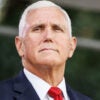Thirty years after his confirmation to the U.S. Supreme Court, Justice Clarence Thomas continues to have a profound influence on American law and culture—evident again with last week’s landmark rulings.
A new book, “Created Equal: Clarence Thomas in His Own Words,” gives readers access to hours of the exclusive content from the justice himself. Building on the success of a PBS documentary by the same name, the book chronicles Thomas’ amazing life and includes unreleased conversations with his wife Ginni Thomas.
Filmmaker Michael Pack, who produced the “Created Equal” documentary, and Mark Paoletta, a personal friend and lawyer who worked with Thomas during his Supreme Court confirmation, join “The Daily Signal Podcast” to share their favorite stories and what you’ll find in the book.
Listen the full interview or read a lightly edited transcript below.
Rob Bluey: We are joined on “The Daily Signal Podcast” today by Michael Pack and Mark Paoletta. They are the co-editors of a new book called “Created Equal: Clarence Thomas in His Own Words.” Gentlemen, thank you for joining the show.
Michael Pack: Thank you for having us on.
Mark Paoletta: Rob, thanks for having us on.
Bluey: Well, we appreciate you being here at The Heritage Foundation where you’re doing an event to celebrate the launch of this excellent new book.
Michael, you have worked on a film by the same name, but let’s focus on the book first because it’s brand new. It’s Clarence Thomas, as the subtitle says, in his own words. Why is it so important for you to collaborate on this particular project at this time?
Pack: It is a spinoff of the film. So the film, for your listeners who haven’t seen it yet—and I hope there are not many, but if there are any, they can still see it. It’s streaming, it’s on Amazon, it’s on Newsmax and Fox Nation. And they could go to our website manifoldproductions.com and find out where else it’s streaming.
So we did the film and the film is called “Clarence Thomas in His Own Words” because I interviewed Justice Thomas and his wife, Ginni, for over 30 hours. And we had him looking directly to camera. So he told his story. So listeners, viewers got his version of events from his birth up to today.
And the interview was over 30 hours, which is longer than any Supreme Court justice has ever granted an interview. And it was an honor to get that from Justice Thomas.
And I always say that we took the 30 hours and we narrowed it down in the first pass to nine. And Mark Paoletta said, “It’s perfect at nine,” but no one else thought so, so we made it the two hours that we had promised PBS to make it. But Mark always wanted to get those missing hours back in. And he came up with the idea of the book as a kind of revenge, I guess, and to get the hours in.
And he was actually right. It was a huge amount of material. The book is 95% new material and it’s really great material. So it’s really Mark’s brainchild.
Paoletta: Yeah, it was quite an honor to work with Michael on the film. He’s the best documentary filmmaker, and to have him interested in making the film on Justice Thomas was just wonderful. And to be able to work on it in the way we did. And the way I did was just a treat.
And as we made the film, though, and we saw all these great passages and exchanges get cut away, it was just killing me that we’re going to lose all of that. And so going through all the interviews and pulling it together into a book as a way to—it’s more material.
So Justice Thomas talks more in-depth about the things that Michael went over in the interview, but also things that he didn’t even touch on, his favorite books or books that had an impact on him in movies, right? But also on expanding on sort of the liberal policies in the left, in their tactics, and how vicious they are, and the tactics they use and how their policies destroy families, right?
And so you hear more of that in this interview. And then it’s just a book, and a book is much more accessible than a movie. People will watch it. Many people have watched this movie multiple times, but it’s not something you just pull up and say, “Oh, I just want to watch this clip,” right? Maybe once in a blue moon.
But with the book, it could sit on your bookshelf. It could sit on your desk. It could sit around and you can pick it up and open up a page.
And the way we made the book is still chronological through his life, right? But the table of contents is really broken out in sort of the title and then five to 10 subtitles, so that if you look at it, you can see, oh, this is going to talk about Carnegie Library, or this is going to talk about his love of Ayn Rand’s “Fountainhead.”
So you can see that and say, “Oh, I want to go look at that part of the book and read it.” So you can read it all the way through, but it’s also very accessible and just more accessible as a book than a movie.
And that’s why I thought getting—I don’t know if it’s my life’s mission, but it’s something I’m very dedicated to, of sort of defending Justice Thomas and promoting his work and his legacy and his life, which has not been done enough. And that more people hopefully will learn more about in this process and as we go forward.
Bluey: That is so true, Mark. And I know that you are somebody who has spent a good portion of your life doing exactly what you just said. And for those of our listeners who aren’t following you on Twitter [@MarkPaoletta], encourage them to do that, to search out the work that you’ve done, not just there, but on your op-eds and everything else that you’ve written.
Michael, you bring a great history of documentary filmmaking. I would like you to each just take a moment to share your connection to Justice Thomas. What was the passion behind the movie to begin with, Michael? And then Mark, if you could recount some of those stories that you shared with Heritage President Kevin Roberts, for our listeners who didn’t hear that particular podcast. I’d love for you just to reflect on the first time you met Justice Thomas and how he’s been an influence in your life.
Pack: Sure. Well, the whole project started because some mutual friends of Justice Thomas’ and mine, people I knew, were concerned that they left and his enemies were telling his story. There was an upcoming HBO movie called “Confirmation” with Kerry Washington as Anita Hill that took a negative view of the Hill-Thomas hearings. And they want to get his story out.
And I didn’t know that much about him, but as soon as I met him I knew, as anyone who has ever met him knows, that he has a great personality, a great life story, and is a great teller of his life story. So as soon as that happened, I really wanted to make the film.
It took me a while to come up with a form of him telling it directly to camera. And we pursued the idea of a traditional documentary first, where we would interview 15 or 20 people on all sides of these issues, but I thought Clarence Thomas’ voice would be lost. And I didn’t want to take sides in these things.
A primary goal was always to get it on PBS. It was released first in movie theaters. It was in over 110 movie theaters until COVID hit, which is a lot for a documentary. Usually five or 10 is pretty good. And then it did really well on PBS. It was on prime time. And as I said earlier, it’s now streaming on Amazon and elsewhere.
So my goal is to get it on PBS, and how was I going to deal with the fairness question in doing all sides and not lose Justice Thomas’ voice? This way the subtitle is “Clarence Thomas in His Own Words,” you’d get to hear his view of everything, including the hearings and his time on the court and his extremely eventful life from poverty in the segregated South to today his way.
And if you don’t like him, you can say, “I don’t believe him.” But we have actually heard from lots of people on the left who saw the film on PBS, who said, “I didn’t like him before. I still don’t agree with him, but now I understand him and where he came from.” And that’s what documentaries are supposed to do.
So that’s how I came to it. And it has been an honor to get to know Justice Thomas and be trusted to tell his life story. He had no editorial input. So it was a lot of trust. And an offshoot of it is to get to know Mark, another great honor and privilege of the process. And that has been great, too. So that’s sort of how I came to it.
Bluey: Thank you, Michael, for sharing that and congratulations on the success that you’ve had. I know the challenges that must go into getting PBS and the distribution into theaters. And I think it’s just a testament to the high quality of your work. And I hope that you have equal success with the book.
Pack: But, well, let me—
Bluey: Yes.
Pack: … make a point before you go on to Mark. I think that conservative films can be successful. The Clarence Thomas film is a model. We try to make films that reach the center, that people can watch—whatever their politics—and give a fair account of what they say they’re going to do. This says the deal with the viewers, this is going to be Clarence Thomas in his own words. And so it is. We can reach the middle, we on the right.
There are way too few conservative filmmakers. And what there are are ones that make sort of red meat conservative films, which preach to the choir, which is fine, but we can’t let the left tell our stories to the entire rest of the American people.
And we can get them out there, PBS and other sources. We simply haven’t put in the time, effort, and money that the left has done to do that. And we, post this film, are going to be dedicated, Manifold Productions, my wife and I, to doing that.
Bluey: That’s great to hear. Thank you for setting the example and being the lead model for, hopefully, future other filmmakers who come and follow in your footsteps.
Pack: We are starting an incubator to train young right-of-center filmmakers. So there are too few of them. The left have hundreds. We do not have any. So we’re going to start by training a few a year and hope to build from there.
Bluey: Mark, take us back to the 1980s when you first met then Clarence Thomas, who was long before he became a judge. But then bring us up to the current situation, the times that you spent together with your family and his wife Ginni and just how he’s been an influence on your life.
Paoletta: Just, he’s a wonderful, wonderful friend and person. I first met him in October of 1983 when I was a senior in college and Vice President [George H.W.] Bush was going up to campaign for my uncle who was the Republican mayor of Bridgeport. I flew up on Air Force Two and went to this event.
And in Bridgeport, Vice President Bush went on to another fundraiser in Staten Island, and I stayed behind. And it just so happened that Clarence Thomas was speaking at a college, Sacred Heart University, where his friend and former colleague in the Reagan administration, Tom Melady, who was my mentor, was hosting him.
And so Clarence and Tom came over, and I was there and one of his aides was there, and we just kind of sat around for about an hour in the Sheraton lobby. And just loved him. Mike, it’s sort of like anyone who meets Clarence Thomas, right, he’s just electrifying. He’s got this great personality, he’s engaging. He engages you, right, and your interests and listens to you unlike so many people, right?
And here I’m a college senior, happy to be up on this trip with the vice president for my uncle. But I meet this guy and he just made such an impression on me.
But I was a senior in college, went on with things. I ended up joining the Bush White House in 1989, was working on judicial selection. And very early in the administration, like in January, February, … we wanted to reach out to Clarence Thomas to see if he’d be interested in being on the D.C. Circuit.
However, I was a young lawyer. I volunteered. I think I’ve referenced meeting him before and reaching out to him and asking him for his articles and his speeches and his writings so we could vet him, right?
And I ended up talking to him probably for an hour when I first called him. And just such a great conversation. [He’s] just so, again, engaging, interesting, funny, just fills the conversation, fills the room.
And from that conversation—and I still have the letter he sent to me. Something like, “I hope your eyes are strong to read all this stuff, because as I look ahead at your task, I know it’s going to be long nights,” or something like that. Out of that was born our friendship.
And I worked with him a little bit on his D.C. Circuit and he offered me a clerkship on the D.C. Circuit. But the counsel’s office offered me a job to work for Boyden Gray, and I stayed in the White House and then ended up working on his confirmation where it was just a war, right? A hell to attack and destroy him. And out of that work, our bond was forged, and worked very closely with him.
I always say a lot of people helped Justice Thomas get confirmed, but the person most responsible was Justice Thomas.
And right from the get-go, right after he was nominated—he was nominated on July 1. I think that was a Monday or Tuesday. That Saturday after kind of all the sort of commotion of the beginning of the confirmation, I went over to his chambers on a Saturday morning on the D.C. Circuit and we went through—and we had become close already by this point, even when he was on the D.C. Circuit, and stayed in touch. I got to know Ginni. And my wife, the four of us were friends.
But he went through his Rolodex with me of everyone: “Who’s this person? Who’s this person? So in case things pop up and as we go through this fight, here are my friends to call.” And I think back on that.
So as these things popped up—because I spent my summer batting down lie after lie after lie on Clarence Thomas, right? That he had a Confederate flag, right? That he was a tax cheat because there was some tax lien on his house, which was completely false, right? There were domestic violence allegations in his divorce, which was completely false.
All of these things just took a lot, a lot of time to respond to, but he had the foresight, sort of, “Mark is going to be my guy to help sort of address all of these things as we’re going through,” and that he trusted to help respond to them.
Bluey: So going back to that moment and, of course, Robert Bork’s confirmation really set us on a path that we find ourselves today where we have these big fights over Supreme Court justices and other judges, frankly. As you talk to Justice Thomas, what are his reflections and thoughts about that period and time and the lies that he was faced with and the terrible situation that he was confronted in, and how did he have the strength and courage to carry on?
Pack: The way he tells it, both in the film and the book, is that not everyone remembers the hearings have two parts. And the first part was sort of like the Bork hearing. It was a vicious attack, as Mark kind of alludes to, on all these other fronts, lies about him. Look at his record, questions from the Senate Judiciary Committee on natural law, on Roe, on all these things. And it was a very tough period of time.
And when that was over, Justice Thomas and Ginni went off on vacation and they thought it was over. And the Senate Judiciary Committee split 6-6 and sent the nomination up to the Senate and they were ready to relax. And then as Mark also said, the Anita Hill allegations were leaked and then it was in NPR and Newsday and the Senate Judiciary Committee was called back.
As Justice Thomas has said, “It’s like we run a marathon, it’s over, you relax, and then you’re told to run another marathon.” And Ginni is very eloquent on this in the book, I think. She said, “There was nothing left of Clarence Thomas. He had used all his normal responses.” And they felt they had to fall back on faith. Ginni particularly talks about this.
I mean, and they no longer cared about getting the nomination. And as you may know, that some of his advisers advised him not to give the famous high-tech lynching speech on the commonsensical thing as if you want people to vote for you, don’t attack them. But he thought it was about honor, honoring his grandparents, honoring the nuns who taught him, defending his values and principles. And he wanted to speak the truth directly and strongly, and so he did.
So that’s the way he tells it. Mark lived through it with him, but that’s the way he tells it.
I want to say something about Mark and the Thomases. So making this film, I’m trying to get the story right and so I talked to Ginni once or twice, and she said, “Well, talk to Mark Paoletta, he knows more about our lives than we do.” And I thought it was kind of an exaggeration, but it turns out to be 100% accurate. So his knowledge is deep. So my knowledge is what Justice Thomas told me in the interview.
Bluey: I agree with you on that, Michael. As I’ve gotten to know Mark—and Mark and I reminisced recently about how we were at the same event here at The Heritage Foundation with Justice Thomas in October of ’07 when his book came out, “My Grandfather’s Son,” and so I believe that about Mark. I think that is true. Mark, fast forward to today. Tthe attacks have not ended. In fact, we’re in the midst of the Jan. 6 committee and we see the attacks continue, not just on Justice Thomas but on Ginni.
How do they get through this? And by the way, I have to commend Ginni for coming out and saying, “I will testify. I will tell you the truth.” So very much taking a page, it seems, from Justice Thomas himself.
Paoletta: It’s unprecedented, the attacks that are on the Thomases. I think it’s sort of directly in relation to sort of Justice Thomas’ influence. They’ve always wanted to destroy him, going back to the confirmation.
Justice Thomas knew that they were coming for him, right? Always. And he never trusted that he was—that there was something. That they’re going to come and try and destroy him. And he had to wear a bulletproof vest at the time because there were death threats on him back then.
So we’re living this right now, right? But I was scarred or informed by that confirmation. The [Brett] Kavanaugh one just seemed to be a replay. But a lot of stuff that’s happening now, it went on with Justice Thomas. It’s just on steroids now across the board, right?
And I think the left wants to destroy the Supreme Court because it’s no longer their playground to enact their legislative priorities, which they couldn’t get through a legislature, either at the state level or the federal level. …
Justice Thomas bears the brunt of it because he’s this black conservative who has never bowed to them. And they’re now trying to get to him through his wife to try and get him to recuse. They know they’ll never bend him or intimidate him. It’s just trying to get him recused in some crazy way.
And I’ve written a lot on this, Rob, and the recusal for arguments have no place in the law or in precedent. There’s lots of judges, injustices, quite frankly, who have had spouses that have been in law firms who have been in the public square where nobody’s recused and they’re actually celebrated for it, right?
So it’s been very tough on the Thomases, particularly Justice Thomas has been through a lot, right? And there’s been times when they’ve actually gone after Ginni Thomas back with Obamacare back in 2012. There was a crazy one there, too, right, where Ginni says, “Obamacare is a disaster.” And for some reason Clarence Thomas is supposed to recuse himself from the Obamacare cases because his wife opined, right?
When we have literally, at the same time, Stephen Reinhardt’s wife, who’s the head of the ACLU. Stephen Reinhardt, judge in the 9th Circuit, very liberal, the most reversed judge, I think, in history, the late Stephen Reinhardt. And his wife is the head of the ACLU of Southern California. And she files a brief in the court below that goes up to his court and he sits on it. And everyone applauds him for this great couple.
So there’s different standards. There’s always different standards for Clarence Thomas, right? And they’re applying him to his wife now, too. But going after his wife is really, really bad. It’s really despicable. And it really hurts Justice Thomas. And he understands it and it’s not going to bend them or break them. It’s just difficult. But they have each other, they have an extraordinarily strong relationship and marriage, and they have their faith. So they’ll get through it.
And this is really Justice Thomas, I call, in full. I mean, the court has come his way on so many cases. He is the leader. He’s got multitudes of former clerks that are judges now that are rising through the ranks, all these law students. As one of his liberal, I don’t know, critics, but a writer said, “Justice Thomas, he’s written these dissents and concurrences that law students have read and said, ‘Wow, I like that and I’m going to use that going forward.'”
And he’s energized the whole army of people to implement. And when I say implement, be faithful to the Constitution as an originalist when they go about and make those arguments and not be afraid to make them and show that courage. I think that’s the greatest legacy of Justice Thomas, is going to be the courage he shows and the kindness.
And as I mentioned to you in the podcast with Kevin, when Justice Thomas had gotten through his confirmation and was all beat up, really beat up and utterly destroyed, he goes on the court, one, the first conference that he sits on, he switches [Chief Justice William] Rehnquist and [Justice Antonin] Scalia’s vote, right? So the racist trope that he has to. But also, just the ability to do that, literally the first week he gets confirmed and walk into this conference.
And then a few months after that, I was diagnosed with cancer and we had just had our first kid. It was obviously devastating. And even though he had been through this terrible trial, he was there for me every single day, called me, came by, visited me, brought me out to his house that he was building and we designed sort of the island—which to this day he says, “Mark and I designed that island”—brought me pies, took me for hamburgers, always checked in on me and just thought about me. And it’s a special thing.
But he does that to hundreds and hundreds of people. And it really is amazing. And that’s the story. He’ll never seek that recognition, right, or that attention for all those things he does. But Justice [Sonia] Sotomayer the other day said, as your listeners may have heard, said something similar, right? “Justice Thomas knows everyone in the courthouse, who their family is or kids, how they’re doing. And that’s just who Justice Thomas is.”
Bluey: Thank you for sharing that personal story, Mark. Appreciate you opening up and letting our listeners hear that. I think it just speaks to his character and humility. So, you mentioned his legacy and I want to ask Michael to weigh in on this as well. How do you think history is going to judge Clarence Thomas?
Pack: I am hoping that his legacy has not been written yet. I’m hoping he stays on the court for a good long time. However, I think he’s done, as Mark said, he’s written over 600 opinions, more than any other Supreme Court justice. He’s influential in almost every area of the law.
We focused in the film, and to some extent in the book, although the book is broader even on the affirmative action cases where he was strong—but he’s been very strong on the administrative law cases.
That’s, I think, another area where he switched or at least persuaded Justice Scalia to come closer to him on perhaps reconsidering Chevron deference and these questions of how to restrain the administrative state, which is the part of government that has taken upon itself legislative, judicial, and executive functions that rightly belonged back in Congress.
There are a lot of areas where he’s influential. But one of the reasons we wanted to tell his life story, and this goes to another point of Mark’s, is, I think he’s influential in his personal story in his life and what he stands for. Maybe more than any listing of the court of opinions he wrote or his positions.
He does affect a lot of people individually that know him, as Mark’s story is a very, very dramatic example of. And I hope the film and the book let people who don’t know him individually as we three do have a chance to spend time with him and get that sense of who he is as a person, beyond the particular stance he takes.
Bluey: Mark, to that point, do you have a favorite part of the book that you particularly recommend to readers or a favorite story from the justice recounted in the film?
Paoletta: That’s tough for me. It’s such an emotional experience with the book. Just like when I read his speeches and articles and he’s just calling people out, “I’m a fighter,” right? And to read Justice Thomas’ take on Congress and just laying him out in those speeches 40 years ago, or 30 years ago, he does a lot of that in the book, right? He really calls out the left and their policies and their tactics. That’s fun, right?
Then you have the personal stories of growing up. I’ve been down to Pin Point several times. I know his mom and sort of the environment he grew up in. And obviously, the visits to the nuns, which he talks about and the influence on them. And again, bringing it back to—again, here’s a story on Justice Thomas.
The Irish nuns ran the school. He went to school. His grandfather enrolled him in St. Benedict’s in segregated South in Savannah. And in the ’80s he goes and seeks them out to thank them for everything they’d done for him. And then one of them testified in his confirmation. And I got to know her, Sister Virgilius, who’s taken on this larger-than-life sort of, whatever, position.
And every Martin Luther King Day for about 15 years, Justice Thomas and I would drive up to go visit the nuns in Tenafly, New Jersey, in the retirement home. So there’s probably 60 of them, 80 of them, all of them between the ages of 60 and the oldest one at the one point was 108. And we’d go spend the day with them and sit in the cafeteria and have lunch, and then we’d drive back down.
And so that’s in the book. But it just brings back a great memory of doing that with him. So it’s a wonderful book on so many levels, including the administrative state.
The other thing that Justice Thomas can do is really break down complicated, constitutional questions in a very relatable way about the separation of powers and how the Founders wanted to separate those powers to protect our liberty. And that administrative state we were just talking about is where they’re all coming back together with these agencies and running our lives.
And it’s just so perfect the way he talks about it. He just breaks it down and that shows you his command, right? And the way he can have your common citizen understand these important, important concepts in our Constitution, in our country.
So as Michael said, the nine-hour film was perfect for me. So there are a lot of parts I like in the book.
Bluey: I’m so glad that you were able to capture it in the book. Michael or Mark, any final words you want to share with our listeners as we wrap-up here about Justice Thomas or your work on this project?
Pack: I think we have to say, appeal to listeners to buy the book, right? It’s available on amazon.com. It’s available on barnesandnoble.com and everywhere else you can get a book.
And I also think they should watch the film, those who haven’t, and that is streaming on Amazon. It’s streaming on Fox Nation and Newsmax and Salem, and many other places. And if they go to our website, manifoldproductions.com, they can have a full list of the places it’s streaming, some for free. So I encourage them to watch it.
There’s nothing I feel that I could say that’s as good as hearing directly from Clarence Thomas. That’s why we structured the book and the film that way. But it has been an honor and privilege to work on the film. And I hope we’ve conveyed some of that to listeners.
Bluey: Michael, and for our listeners we’ll make sure that if you go to dailysignal.com, you’re able to get links to all of those places to buy the book or watch the film. So thank you for outlining them for us.
Paoletta: And Rob, I really want to thank you and Heritage and Kevin Roberts in particular. What Heritage has done to honor Justice Thomas is just really, really amazing.
And there was a symposium, I guess, in October of 2021 honoring Justice Thomas’ 30 years on the bench. And it was a full-day symposium with a number of his former law clerks that are judges talking about Justice Thomas’ jurisprudence. And I would invite your listeners to go to your site and look at that symposium. Justice Thomas actually gives a speech, which is definitely worth hearing, obviously.
And so, I had the pleasure of sitting down with Kevin and you doing this, and we’re having an event tonight to celebrate the launch. Today is publication day for our book and just really honored to be here and to be able to talk about Justice Thomas.
Bluey: Thank you both again for co-editing “Created Equal: Clarence Thomas in His Own Words.” We’ll be sure to leave our listeners with a link to purchase the book and follow your work as well. I know this is not the end of what you’re doing, Mark, in terms of telling the truth about Justice Thomas and Ginni. And Michael, it sounds like you have exciting plans in the future with your productions. And so we hope that this is not the last conversation we have. You’re always welcome back at The Daily Signal.
Pack: Thank you.
Paoletta: Thanks, Rob.
Pack: We appreciate it.
Have an opinion about this article? To sound off, please email [email protected] and we’ll consider publishing your edited remarks in our regular “We Hear You” feature. Remember to include the url or headline of the article plus your name and town and/or state.































